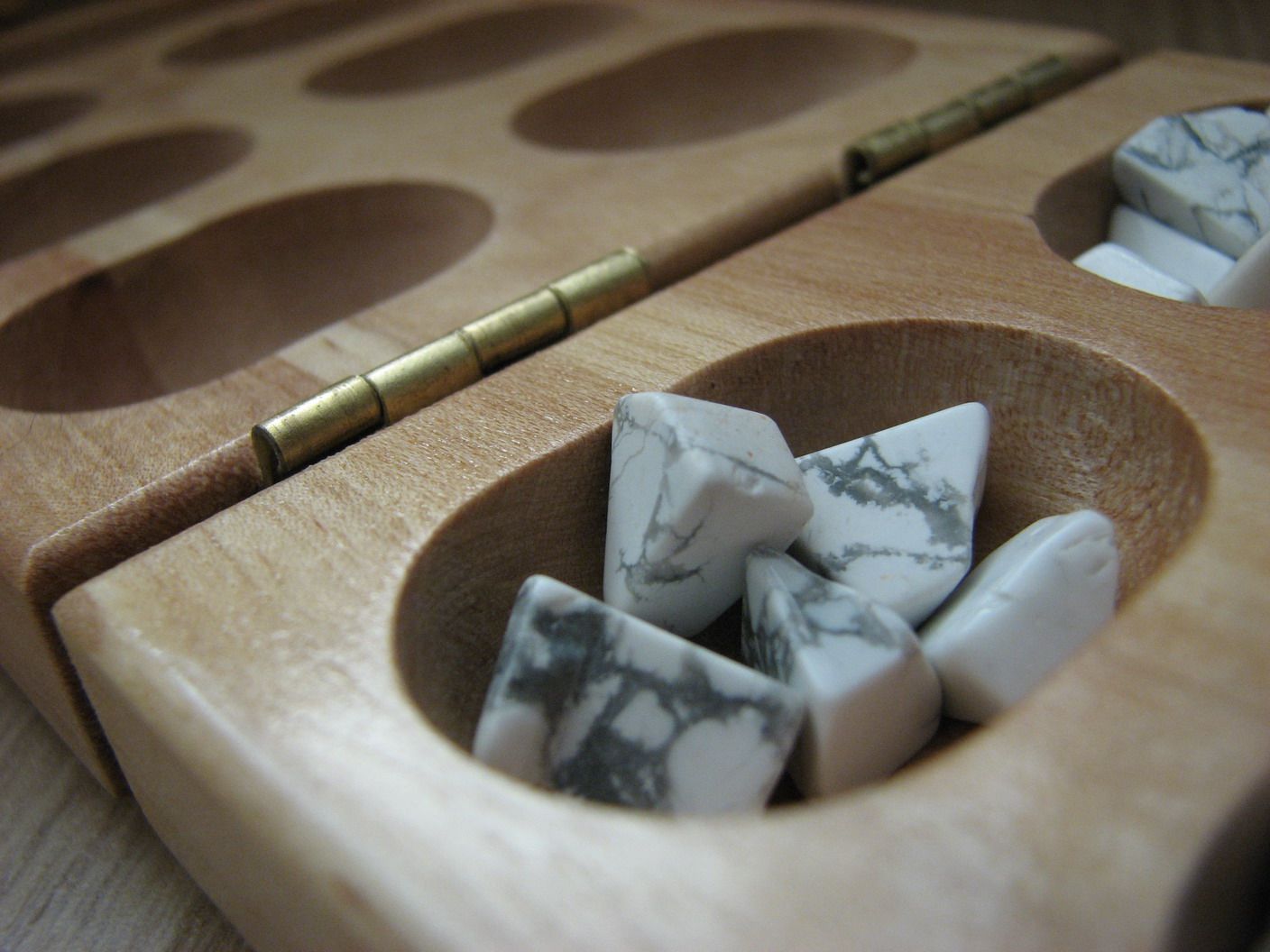
Kalah (700)
2 - 2 persone
10 - 10 min
5+
Al momento questo prodotto non è disponibile presso nessun venditore.
Nomi alternativi: Arcana, Awélé, Badari, Bantumi, Carcara, Classic Mancala, Conference, Congklak, Folding Mancala The African Stone Game, El Glotón, Kalah, Kalaha, Kalaha Spel, Kalahar, Kalahr, Mancala, Mancala for Kids, The Mancala Game, Mancala Junior, Mandinka, Mankala, Maya 6x6, Mop-up, Parlor Mancala, Sabo, Sahara, Serata, Sungka, Teddy, Travel Mancala, Μανκάλα, マンカラ, 만칼라
Editori: (Public Domain), (Unknown), ABRA, Adrenaline Brush Ltd, Alga, ASS Altenburger Spielkarten, Barnes & Noble, Bohemia, Brain Games Germany, Brio AB, Brookstone, The Canadian Group, Cardinal, Carrom Art, Cayro, The Games, CHH Games, Classic Games, Creative Crafthouse, Cylinder Games, Daddy-O Productions, Dal Negro, danspil, DeAgostini, Dilemma Games, Domino-Verlag, Dujardin, E. S. Lowe Company Inc., Elven Games, Endless Games (I), Estrela, Fame Products, Fratelli Fabbri Editori (Fabbri Editore), Fundex, Games & Graphics Inc., Gemini-Games, Geoludie, Gerd Koch, Goki, Great American Trading Company, Hartung-Spiele, Holzinsel, IKEA, Intermu00f3n Oxfam, Joen, Joker, Juguetes del Puerto, Jumbo, King International, Kontrell Industries, L. P. Septu00edmio, Lagoon Games, Lazy Days (I), Learningsmith, Ludens Spirit, Maplegrove, Melissa & Doug, Mitra, Monkey Pod Games, Mu00fcller Ltd. & Co. KG, Natural Wonders, Noris Spiele, Oficina do Aprendiz, Origem, Parker Brothers, Pavilion, Pelikan, Philos, PICO PAO / Juegos de la Antigu00fcedad, Piet Hein & Skju00f8de, Piet Hein A/S, Pin International, Planet Finska, Plasticart, Plastolus Szarvas, Pressman Toy Corp., Profound, Queen Games, Ramsons, RCR Terry GmbH, Schmidt Spiele, Schylling, Science4You, Skor-Mor, Spear's Games, Spin Master Ltd., SPM: Syarikat Permainan Malaysia, Square Root Games, Starbucks Coffee Company, Tactic, Target, Top-Game, Top-Toy, University Games, VEB Plastspielwaren Berlin, Whitman Golden Ltd., Wood Expressions, Woodstock Spiele, Worldwide Games, Inc., WWF, Yellow Mountain Imports
Descrizione: The most common rule set in games sold commercially as Mancala is for this game of Kalah. Mancala is actually a whole family of games. Kalah was invented in 1940 by an American, William Champion Jr.. He started selling the game in 1944, patented the rules in the 1950's, and founded the Kalah Game Co. in 1958.
The game is played on a board of two rows, each consisting of six round pits. The rows have a large store at either end called the Kalah. A player owns the six pits closest to them and the Kalah on their right side.
The game is started with four (4) seeds in each pit. A player takes all the seeds from one of their pits, and then they are distributed one by one, counterclockwise, in the pits and the player's own Kalah, but not into the opponent's store (Kalah). If the last seed is dropped into an opponent's pit or a non-empty pit of the player, the move ends without anything being captured. If the last seed falls into the player's Kalah, they must move again. If the last seed is put into an empty pit owned by the player, they capture all contents of the opposite pit together with the capturing piece and puts them in their Kalah. If the opposite pit is empty, nothing is captured. A capture ends the move.
The game ends when one player no longer has any seeds in any of their holes. The remaining pieces are captured by their adversary. The player who has captured the most pieces is declared the winner.
Variants:
Beginners may start with 3 seeds in each pit, but the game can also be played with 5 or 6 seeds in each pit. William Champion Jr. recommended the expert game with 6 in each pit.
The game is played on a board of two rows, each consisting of six round pits. The rows have a large store at either end called the Kalah. A player owns the six pits closest to them and the Kalah on their right side.
The game is started with four (4) seeds in each pit. A player takes all the seeds from one of their pits, and then they are distributed one by one, counterclockwise, in the pits and the player's own Kalah, but not into the opponent's store (Kalah). If the last seed is dropped into an opponent's pit or a non-empty pit of the player, the move ends without anything being captured. If the last seed falls into the player's Kalah, they must move again. If the last seed is put into an empty pit owned by the player, they capture all contents of the opposite pit together with the capturing piece and puts them in their Kalah. If the opposite pit is empty, nothing is captured. A capture ends the move.
The game ends when one player no longer has any seeds in any of their holes. The remaining pieces are captured by their adversary. The player who has captured the most pieces is declared the winner.
Variants:
Beginners may start with 3 seeds in each pit, but the game can also be played with 5 or 6 seeds in each pit. William Champion Jr. recommended the expert game with 6 in each pit.
